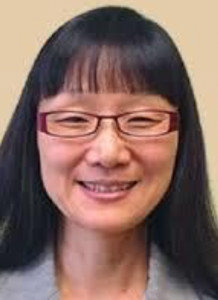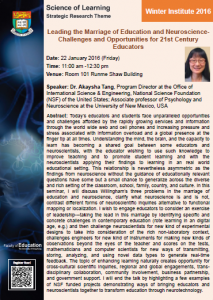Leading the marriage of education and neuroscience-challenges and opportunities for 21st Century Educators

Speaker: Dr. Akaysha Tang, Program Director at the Office of International Science & Engineering, National Science Foundation (NSF) of the United States; Associate Professor of Psychology and Neuroscience at the University of New Mexico, USA
Date: 22 January 2016 (Friday)
Time: 11:00 am -12:30 pm
Venue: Room 101 Runme Shaw Building
Chair: Professor Brendan Weekes
Register
Abstract
Today’s educators and students face unparalleled opportunities and challenges afforded by the rapidly growing services and information through the world wide web and cell phones and increasing pressure and stress associated with information overload and a global presence at the finger tip at all times. Understanding the mind, the brain, and the capacity to learn has becoming a shared goal between some educators and neuroscientists, with the educator wishing to use such knowledge to improve teaching and to promote student learning and with the neuroscientists applying their findings to learning in an real world educational setting. This relationship is nevertheless asymmetric as the findings from neuroscience without the guidance of educationally relevant questions have some but a small chance to generalize across the diverse and rich setting of the classroom, school, family, country, and culture. In this seminar, I will discuss Willingham’s three problems in the marriage of education and neuroscience, clarify what neuroscience is and is not, contrast different forms of neuroscientific inquiries alternative to functional mapping or localization. I wish to engage educators to consider an exercise of leadership—taking the lead in this marriage by identifying specific and concrete challenges in contemporary education (rote learning in an digital age, e.g.) and then challenge neuroscientists for new kind of experimental designs to take into consideration of the rich non-laboratory context, challenges engineers for new kind of instruments for making new kinds of observations beyond the eyes of the teacher and scores on the tests, mathematicians and computer scientists for new ways of transmitting, storing, analyzing, and using novel data types to generate real-time feedback. The topic of enhancing learning naturally creates opportunity for cross-cultural scientific inquiries, regional and global engagements, trans-disciplinary collaboration, community involvement, business partnership, and government support. I will end the talk by highlighting a few examples of NSF funded projects demonstrating ways of bringing educators and neuroscientists together to transform education through neurotechnology.
This seminar is intended to be a dialogue with an audience of diverse background with a shared interest in education. Teachers and students at all levels are particularly welcome to participate.
About the speaker
Tang is currently the Program Director at the Office of International Science & Engineering, National Science Foundation (NSF) of the United States. While serving as the China Program Director, among other responsibilities, Tang handled a wide range of NSF proposals and meetings involving international collaborations between US and other countries, particularly China. In her two years of service as Program Director for Cognitive Neuroscience (2012—2014) prior to the current appointment, Tang handled over 300 proposals through both ad hoc and panel reviews and through co-review and co-funding with up to 18 different programs within NSF. Concurrently, Tang is a tenured (2004) associate professor of Psychology and Neuroscience at the University of New Mexico, USA. She founded and have been directing two laboratories, a rodent developmental cognitive neuroscience laboratory and a human high-density EEG based source-imaging lab. The animal-based neuroscience research focuses on enhancing cognitive, social, and emotional development via programming of stress response and serves to provide and test theoretical frameworks for underlying neural mechanisms critical for successful learning enhancement. The high-density source imaging research focuses on developing new enabling technology for supporting individualized teaching and individualized brain health care in the real world context. Tang works through collaborations with scientists from a wide range of disciplines: computer scientists, mathematicians, physicists, electrical and biomedical engineers, neuroendocrinologists, and cognitive neuroscientists within and outside of US. Through integration across levels of analysis and across laboratory and real world contexts, Tang seeks to understand the pervasive role of stress hormones and its regulation on all aspects of human function, including learning and health and to develop innovative methods to shape individual’s ability to effectively regulate ones own stress response for betterment of life.
Tang grew up in China. As a teenager, she was a dedicated competitive swimmer before she directed her energy to academic pursuit. After receiving her first bachelor’s degree in Computer Science from Peking University (1984), she worked as a software engineer at the Software Research Institute, Chinese Academy of Sciences in Beijing (1984—1986). Influenced by Herbert Simon’s lectures at PKU on the then new field of cognitive science and artificial intelligence, she pursued a second bachelor’s degree in experimental psychology at Grinnell College in Iowa, United States. As an international student, she pursued and received Sloan Foundation Grants twice to engage in neural network research in the Computer Science Departments, once at Carnegie-Mellon University, USA and the second at Stirling University, UK. She also pursued an opportunity to work as an undergraduate intern in the prestigious Neuropsychology Lab at the National Institute of Health (NIH). She received her PhD (1995) from the Department of Psychology at Harvard University for her transdisciplinary thesis that utilized in vitro electrophysiological, computational, and psychopharmacological techniques to investigate how an inhibitory neurotransmitter can affect habituation, a form of learning, in a rodent model system. This work won her the best thesis award from Society for Cognitive Neuroscience. During her years of graduate study, she also spent one year as an exchange scholar at the Cellular & Molecular Physiology Department, Yale University to study learning in an invertebrate model system using optical imaging techniques. Post her PhD work, Tang was a Howard Hughes Medical Institute fellow and research associate at the Computational Neurobiology Lab, Salk Institute for Biological Studies, San Diego, USA, where she studied how neurochemicals modulate the timing of neural activities. Since 1997, Tang has been on the faculty at the University of New Mexico and during this time, she have held several concurrent positions, visiting professorship at the Rockefeller University and University College London and two rotating program directorship at the US National Science Foundation.
Email: akaysha@unm.edu; atang@nsf.gov
Web sites: http://atlab.unm.edu



